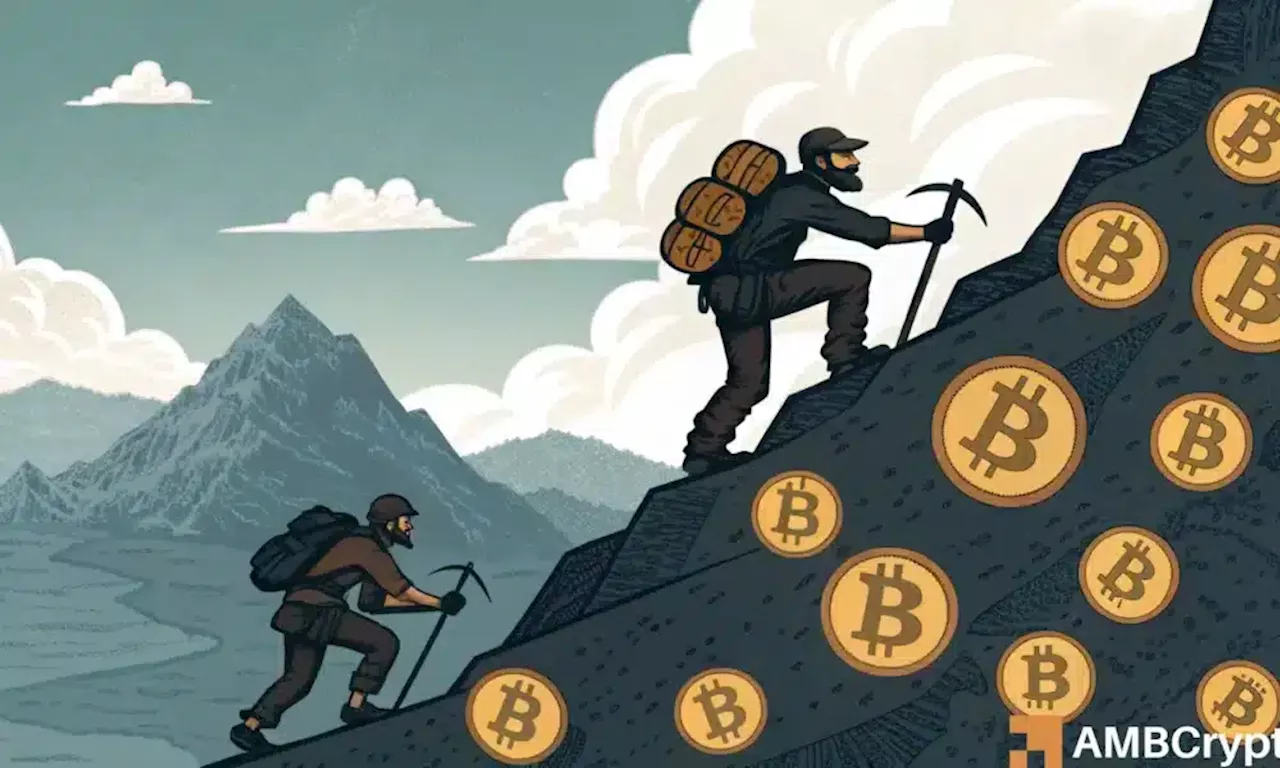The rise of AI is creating significant challenges for Bitcoin miners, forcing them to adapt or risk obsolescence. Declining transaction fees, coupled with AI-driven competition for resources, are threatening the viability of traditional mining operations.
The ascent of artificial intelligence (AI) is exerting significant pressure on Bitcoin miners, compelling them to adapt or face the prospect of becoming obsolete. Transaction fees have recently plummeted to their lowest levels since the 2015 bear market, triggering alarm bells within the mining community. This sharp decline in fees compounds the challenges miners already face due to market volatility .
Adding further complexity to the situation, the emergence of AI and other technological disruptions is threatening to erode traditional mining operations. As revenue streams dwindle and competition intensifies, the long-term viability of Bitcoin mining is coming under intense scrutiny. Transaction fees constitute a vital revenue source for Bitcoin miners, particularly following halving events that reduce block rewards. With total transaction fees reaching their lowest point since the 2015 bear market, miners are grappling with diminished income. During bull markets, heightened network activity drives increased fees, while reduced trading volumes in bear markets contribute to sharp declines.The rise of AI is instigating a fundamental transformation across industries, and Bitcoin mining is no exception. The computational demands fueled by AI are diverting energy and hardware resources away from traditional mining operations, escalating the cost of running mining rigs. Trading bots powered by AI are optimizing transactions to minimize costs, further reducing dependence on expensive priority transactions and thereby exacerbating the downward pressure on fees. This presents a dual challenge for miners: competing for computational resources with AI-driven sectors while adapting to fee structures influenced by these technologies. Miners are not only contending with declining fees but also navigating an increasingly volatile market environment. Fluctuations in Bitcoin's price and competition from institutional mining players are creating an unstable revenue ecosystem. Coupled with AI-induced disruptions, these factors are pushing smaller mining operations out of the market. Mining pools are consolidating, and operational efficiency is emerging as a critical determinant of survival. The dual pressures of market volatility and disruptive technology place miners at a crossroads, compelling them to innovate or risk becoming obsolete.
Bitcoin Mining Artificial Intelligence Transaction Fees Market Volatility
Canada Latest News, Canada Headlines
Similar News:You can also read news stories similar to this one that we have collected from other news sources.
 Bitcoin traders, miners unite – Could BTC soar 560%?BTC could surge 560% as miners profit and long-term holders accumulate, potentially reaching $589K before the end of this cycle.
Bitcoin traders, miners unite – Could BTC soar 560%?BTC could surge 560% as miners profit and long-term holders accumulate, potentially reaching $589K before the end of this cycle.
Read more »
 Bitcoin Miners Shift Strategy Amidst Easing Selling PressureBitcoin miners, facing record-high operational costs, have been liquidating reserves to cover expenses, contributing to market volatility. However, recent data suggests a slowdown in selling activity in early 2025, raising questions about the future direction of the market.
Bitcoin Miners Shift Strategy Amidst Easing Selling PressureBitcoin miners, facing record-high operational costs, have been liquidating reserves to cover expenses, contributing to market volatility. However, recent data suggests a slowdown in selling activity in early 2025, raising questions about the future direction of the market.
Read more »
 Bitcoin Consolidates After FOMC, Tether Expands on Bitcoin Network, Kraken Resumes StakingBitcoin has been trading in a tight range after the Federal Open Market Committee (FOMC) meeting. The Fed maintained its interest rate, citing 'somewhat elevated' inflation. Meanwhile, Tether announced plans to mint USDT on Bitcoin's base layer and Lightning Network, utilizing the Taproot Assets protocol. Kraken also resumed crypto staking in the US after a two-year hiatus due to SEC regulations. Additionally, the news highlights the potential for BTC and ETH ETFs to list soon, with recent updates on S-1 filings signaling a near future launch.
Bitcoin Consolidates After FOMC, Tether Expands on Bitcoin Network, Kraken Resumes StakingBitcoin has been trading in a tight range after the Federal Open Market Committee (FOMC) meeting. The Fed maintained its interest rate, citing 'somewhat elevated' inflation. Meanwhile, Tether announced plans to mint USDT on Bitcoin's base layer and Lightning Network, utilizing the Taproot Assets protocol. Kraken also resumed crypto staking in the US after a two-year hiatus due to SEC regulations. Additionally, the news highlights the potential for BTC and ETH ETFs to list soon, with recent updates on S-1 filings signaling a near future launch.
Read more »
 Reactivated Bitcoin: Impact on Scarcity and Market VolatilityThe reactivation of dormant Bitcoin, driven by factors like the launch of the Bitcoin ETF, is raising questions about Bitcoin's perceived scarcity and its potential impact on price fluctuations. While Bitcoin's total supply remains fixed, the influx of long-held coins into circulation could temporarily dilute its scarcity, leading to short-term market volatility.
Reactivated Bitcoin: Impact on Scarcity and Market VolatilityThe reactivation of dormant Bitcoin, driven by factors like the launch of the Bitcoin ETF, is raising questions about Bitcoin's perceived scarcity and its potential impact on price fluctuations. While Bitcoin's total supply remains fixed, the influx of long-held coins into circulation could temporarily dilute its scarcity, leading to short-term market volatility.
Read more »
 Bitcoin Price Could Explode to $249,000 by 2025, Says CryptoQuantNew data from CryptoQuant suggests Bitcoin's price could reach as high as $249,000 by 2025 under ideal conditions. The projections are based on Bitcoin's realized cap growth and market multipliers, with three potential scenarios outlined. The most optimistic scenario sees Bitcoin's market cap hitting nearly $5 trillion, driven by continued institutional adoption and strong capital inflows. Even the most conservative estimate places Bitcoin's price at $145,000 by 2025.
Bitcoin Price Could Explode to $249,000 by 2025, Says CryptoQuantNew data from CryptoQuant suggests Bitcoin's price could reach as high as $249,000 by 2025 under ideal conditions. The projections are based on Bitcoin's realized cap growth and market multipliers, with three potential scenarios outlined. The most optimistic scenario sees Bitcoin's market cap hitting nearly $5 trillion, driven by continued institutional adoption and strong capital inflows. Even the most conservative estimate places Bitcoin's price at $145,000 by 2025.
Read more »
 FTSE 100 Ends Flat as Copper Miners DeclineLondon's FTSE 100 index closed marginally lower on Wednesday, snapping a five-day winning streak. The decline was attributed to a drop in shares of heavyweight copper miners, which outweighed positive corporate updates and expectations of further monetary policy easing. Meanwhile, the midcap FTSE 250 index also retreated, while the broader European STOXX 600 reached a record high, seemingly unfazed by new U.S. President Donald Trump's tariff threats.
FTSE 100 Ends Flat as Copper Miners DeclineLondon's FTSE 100 index closed marginally lower on Wednesday, snapping a five-day winning streak. The decline was attributed to a drop in shares of heavyweight copper miners, which outweighed positive corporate updates and expectations of further monetary policy easing. Meanwhile, the midcap FTSE 250 index also retreated, while the broader European STOXX 600 reached a record high, seemingly unfazed by new U.S. President Donald Trump's tariff threats.
Read more »
